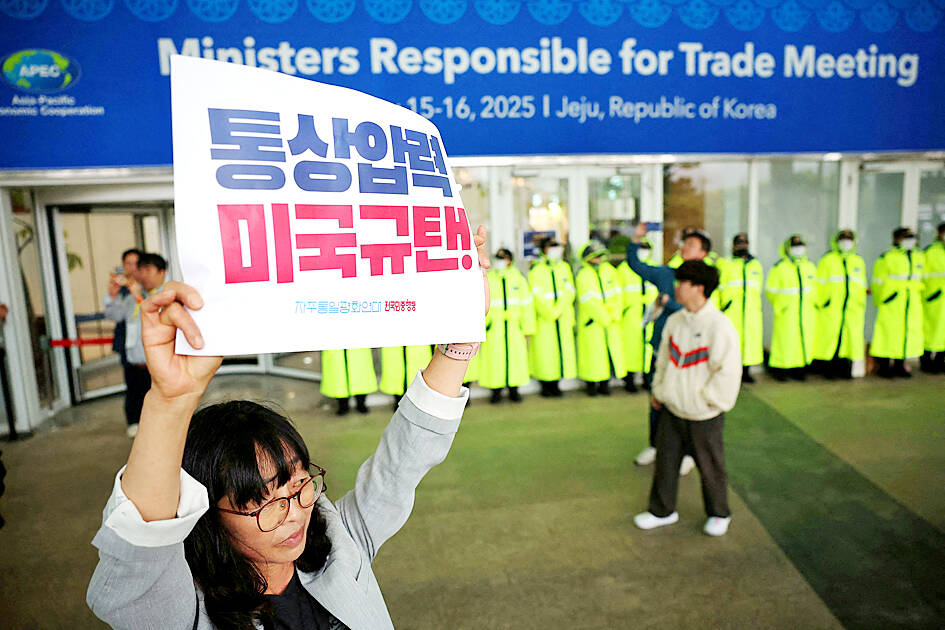The US demanded that South Korea resolve the large trade imbalance between the countries during recent trade talks, South Korean media reported yesterday.
The US repeatedly raised the issue of the trade imbalance in the commodity sector and both countries agreed it was necessary to address it, broadcaster YTN and the Yonhap News Agency reported, citing an unnamed South Korean trade official who was part of the trade delegation.
South Korea had a record US$55.6 billion trade surplus with the US last year, up 25 percent from 2023, Korea Customs Service data showed.

Photo: Reuters
The two countries held technical consultations about trade in Washington last week. They also discussed non-tariff measures, economic security, digital trade, the origin of goods and commercial considerations, the official cited by media said, adding that Washington made specific requests for the first time.
Seoul has continued to push for tariff exemptions, the official said.
South Korea, which is among a few Asia-Pacific nations that have a free-trade pact with the US, has sought exemptions on all tariffs.
South Korean Minister of Industry, Trade and Energy Ahn Duk-geun said after a second round of ministerial-level talks in the middle of this month that a request by Alphabet Inc’s Google to transfer local map data overseas could be part of trade discussions.
The US had cited South Korea’s restrictions on online platform companies transferring location-based data overseas in its trade barrier report released in March.
South Korean media have also said that US objections over restrictions on its beef imports and tariffs on rice could be included in talks.
Separately, the US and Japan agreed in their latest tariff negotiations to “accelerate” efforts toward an agreement, Tokyo said yesterday. Japan is subject to the same 10 percent baseline tariffs imposed on most nations, plus steeper levies on cars, steel and aluminum.
US President Donald Trump early last month also announced 24 percent “reciprocal” tariffs on Japan, but later paused them to July.
Japan’s tariff talks envoy Ryosei Akazawa held a third round of talks in Washington over the weekend and is due to return this week.
The two nations confirmed “we will accelerate efforts to realize an agreement that is mutually beneficial,” Japanese Chief Cabinet Secretary Yoshimasa Hayashi said.
Japanese Prime Minister Shigeru Ishiba on Sunday also touted “progress” in the latest talks. Floated as one of Japan’s bargaining chips is its technological prowess in shipbuilding, including of ice-breakers, local media said.
“The US is interested in potentially having Japan repair American warships, which is something we’re willing to support,” NHK quoted Ishiba as saying.
Another potential sweetener is the idea of a joint US-Japanese sovereign wealth fund floated by Softbank Group Corp founder — and Trump friend — Masayoshi Son, the Financial Times said.
The fund, discussed directly between Son and US Secretary of the Treasury Scott Bessent, would make large-scale investments in tech and infrastructure across the US, it reported.
Additional reporting by AFP

In Italy’s storied gold-making hubs, jewelers are reworking their designs to trim gold content as they race to blunt the effect of record prices and appeal to shoppers watching their budgets. Gold prices hit a record high on Thursday, surging near US$5,600 an ounce, more than double a year ago as geopolitical concerns and jitters over trade pushed investors toward the safe-haven asset. The rally is putting undue pressure on small artisans as they face mounting demands from customers, including international brands, to produce cheaper items, from signature pieces to wedding rings, according to interviews with four independent jewelers in Italy’s main

Japanese Prime Minister Sanae Takaichi has talked up the benefits of a weaker yen in a campaign speech, adopting a tone at odds with her finance ministry, which has refused to rule out any options to counter excessive foreign exchange volatility. Takaichi later softened her stance, saying she did not have a preference for the yen’s direction. “People say the weak yen is bad right now, but for export industries, it’s a major opportunity,” Takaichi said on Saturday at a rally for Liberal Democratic Party candidate Daishiro Yamagiwa in Kanagawa Prefecture ahead of a snap election on Sunday. “Whether it’s selling food or

CONCERNS: Tech companies investing in AI businesses that purchase their products have raised questions among investors that they are artificially propping up demand Nvidia Corp chief executive officer Jensen Huang (黃仁勳) on Saturday said that the company would be participating in OpenAI’s latest funding round, describing it as potentially “the largest investment we’ve ever made.” “We will invest a great deal of money,” Huang told reporters while visiting Taipei. “I believe in OpenAI. The work that they do is incredible. They’re one of the most consequential companies of our time.” Huang did not say exactly how much Nvidia might contribute, but described the investment as “huge.” “Let Sam announce how much he’s going to raise — it’s for him to decide,” Huang said, referring to OpenAI

The global server market is expected to grow 12.8 percent annually this year, with artificial intelligence (AI) servers projected to account for 16.5 percent, driven by continued investment in AI infrastructure by major cloud service providers (CSPs), market researcher TrendForce Corp (集邦科技) said yesterday. Global AI server shipments this year are expected to increase 28 percent year-on-year to more than 2.7 million units, driven by sustained demand from CSPs and government sovereign cloud projects, TrendForce analyst Frank Kung (龔明德) told the Taipei Times. Demand for GPU-based AI servers, including Nvidia Corp’s GB and Vera Rubin rack systems, is expected to remain high,